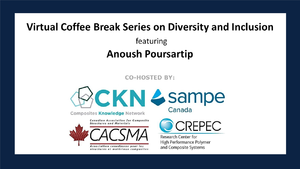D&I featuring Anoush Poursartip - A348
| D&I featuring Anoush Poursartip | |
|---|---|
| Perspectives article | |

| |
| Document Type | Article |
| Document Identifier | 348 |
|
Webinar Date
Featuring
Anoush Poursartip
| |
Introduction
In this series of virtual coffee breaks, we discuss a variety of subjects related to Diversity and Inclusion (D&I). Topics will include the importance of D&I, mentorship, allyship, how to make your workplace more inclusive, unconscious bias, and more. Everyone is welcome to join.
This session features Anoush Poursartip, Professor, University of British Columbia speaking about “Trying to be a good supervisor: Reflections on 35 years of stumbling around.”
Biography
Anoush was born in Vienna, Austria to Iranian parents. Up to the age of 14, he lived in Austria, Italy, Spain, and Iran. His parents then shipped him off to a boarding school in England, where he stayed on to do his undergrad and PhD before coming to Canada and UBC in 1984. He became a faculty member in 1986, and his first students and co-workers were older than him. Thirty-plus years later, he is older than everybody else. Anoush is married to the world’s nicest and best pharmacist and is blessed with two wonderful sons.
Video
| About | Help |
Welcome
Welcome to the CKN Knowledge in Practice Centre (KPC). The KPC is a resource for learning and applying scientific knowledge to the practice of composites manufacturing. As you navigate around the KPC, refer back to the information on this right-hand pane as a resource for understanding the intricacies of composites processing and why the KPC is laid out in the way that it is. The following video explains the KPC approach:
Understanding Composites Processing
The Knowledge in Practice Centre (KPC) is centered around a structured method of thinking about composite material manufacturing. From the top down, the heirarchy consists of:
- The factory
- Factory cells and/or the factory layout
- Process steps (embodied in the factory process flow) consisting of:
The way that the material, shape, tooling & consumables and equipment (abbreviated as MSTE) interact with each other during a process step is critical to the outcome of the manufacturing step, and ultimately critical to the quality of the finished part. The interactions between MSTE during a process step can be numerous and complex, but the Knowledge in Practice Centre aims to make you aware of these interactions, understand how one parameter affects another, and understand how to analyze the problem using a systems based approach. Using this approach, the factory can then be developed with a complete understanding and control of all interactions.
Interrelationship of Function, Shape, Material & Process
Design for manufacturing is critical to ensuring the producibility of a part. Trouble arises when it is considered too late or not at all in the design process. Conversely, process design (controlling the interactions between shape, material, tooling & consumables and equipment to achieve a desired outcome) must always consider the shape and material of the part. Ashby has developed and popularized the approach linking design (function) to the choice of material and shape, which influence the process selected and vice versa, as shown below:
Within the Knowledge in Practice Centre the same methodology is applied but the process is more fully defined by also explicitly calling out the equipment and tooling & consumables. Note that in common usage, a process which consists of many steps can be arbitrarily defined by just one step, e.g. "spray-up". Though convenient, this can be misleading.
Workflows
The KPC's Practice and Case Study volumes consist of three types of workflows:
- Development - Analyzing the interactions between MSTE in the process steps to make decisions on processing parameters and understanding how the process steps and factory cells fit within the factory.
- Troubleshooting - Guiding you to possible causes of processing issues affecting either cost, rate or quality and directing you to the most appropriate development workflow to improve the process
- Optimization - An expansion on the development workflows where a larger number of options are considered to achieve the best mixture of cost, rate & quality for your application.
To use this website, you must agree to our Terms and Conditions and Privacy Policy.
By clicking "I Accept" below, you confirm that you have read, understood, and accepted our Terms and Conditions and Privacy Policy.





